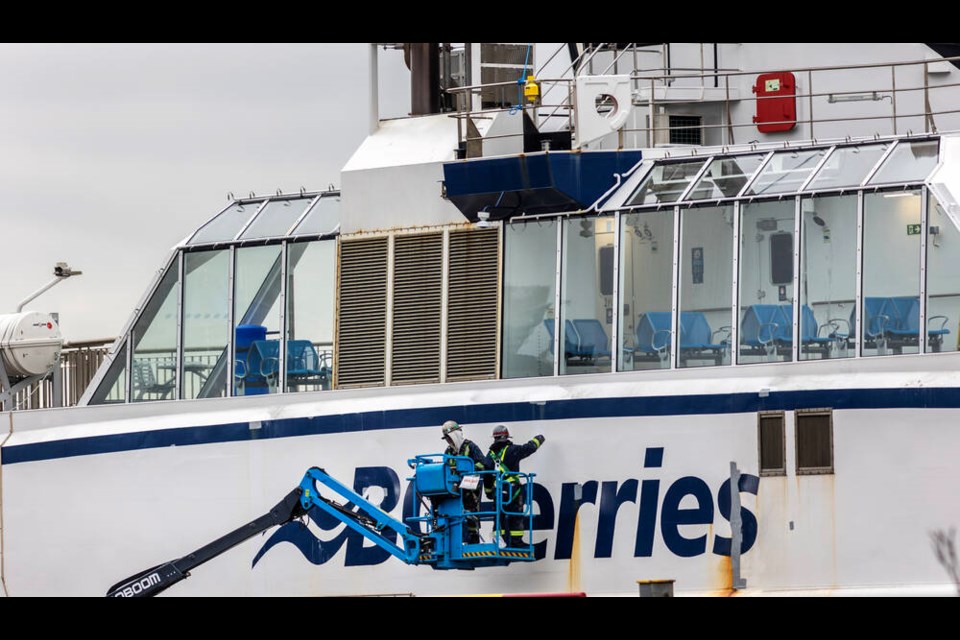The union representing B.C. Ferries workers is calling on the next federal government to commit to a larger investment in marine transportation on the West Coast and bring it more in line with funding of the ferry system on the East Coast.
The B.C. Ferry & Marine Workers’ Union is pushing candidates from all parties to agree to better fund B.C. Ferries and its vessel-renewal strategy.
“If you look at the populations of Newfoundland and P.E.I., Vancouver Island has more than both those provinces combined, and our fares are substantially higher,” said union president Eric McNeely.
“I’m sure everyone on the West Coast would like to see fares go down.”
Right now, B.C. Ferries, which according to the union carries more than 21 million passengers and $8 billion in cargo each year, receives about $35 million annually from Ottawa. At the same time, Via Rail gets about $380 million in operating funds, and Marine Atlantic gets nearly $130 million from the federal government. Marine Atlantic carries fewer than 400,000 passengers annually on its ferry service..
“The West Coast, it’s the largest ferry fleet in Canada, and it’s getting nowhere near the support that the East Coast fleet is,” he said.
McNeely said the last week of the federal election campaign has provided a unique opportunity to highlight the importance of the marine highway on the West Coast.
And he suggested the parties have started to take notice, especially following another weekend of long lines at the province’s ferry terminals.
“That increased awareness can only benefit the travelling public and citizens and voters in British Columbia,” he said.
McNeely said while there has been no commitment from any of the parties for West Coast ferries yet, the fact they’re at least talking about ferry travel — albeit on the East Coast — suggests it’s on the agenda.
Liberal Leader Mark Carney made promises earlier this week to cut tolls on the Confederation Bridge, which connects Prince Edward Island with New Brunswick, and cut in half the cost of Northumberland Ferries fares between P.E.I. and Nova Scotia and Marine Atlantic’s ferry fares between Newfoundland and Nova Scotia.
McNeely argued that kind of attention is more warranted in B.C., where the ferry fleet is considerably larger, carries more people and handles more cargo.
McNeely said B.C. Ferries’ haulage of cargo alone should be enough for the federal government to commit to a sustainable long-term investment in B.C. Ferries.
“Our ferries are lifelines for coastal communities, but they’re underfunded, increasingly unreliable and in serious need of federal attention,” he added. “We’re asking candidates to treat our ferries the same way they treat highways and public transit — essential infrastructure that deserves long-term investment.”
The union, which represents more than 4,500 ferry and marine workers, noted the ferries are falling apart, with 11 vessels in the fleet now more than 45 years old and an average vessel age of 30.
McNeely said the union is also pushing the federal candidates to commit to empowering workers to have more say in the safety of the system.
“Our members keep the system running every day, and they know what’s needed to keep it safe,” he said. “We’re calling for fair funding, stronger safety measures, and a real voice for workers.”
McNeely said he’s aware the noise over U.S. President Donald Trump, the trade war and tariffs has eclipsed many other issues on the campaign trail, but the ferry issue was thrust into the spotlight recently on Easter Monday, when the Queen of Coquitlam had to be pushed to shore in Horseshoe Bay in West Vancouver after suffering a mechanical failure. Passengers were stranded for hours waiting for the problem to be resolved.
Bruce Williams, chief executive of the Greater Victoria Chamber of Commerce, said the ferry issue has definitely been raised by the business community during the campaign.
At the end of March, the Office of the B.C. Ferries Commissioner decided to approve only four of the five new major vessels B.C. Ferries had asked for.
“The capacity of B.C. Ferries is going to be reduced by [the ferry commissioner] not agreeing to do the fifth ferry,” Williams said, noting the chamber has sent a letter to Premier David Eby to say that decision showed a lack of foresight.
The fifth vessel would have served as a relief ship for the fleet, but Commissioner Eva Hage said it wasn’t essential in the first phase of a major vessel program.
Williams said another application has to be made for that fifth vessel and suggested the federal government should be involved in paying for it.
“If we wanted to get that fifth ship in place, maybe the feds could consider putting some dough in, because the province probably won’t,” he said.
>>> To comment on this article, write a letter to the editor: [email protected]



